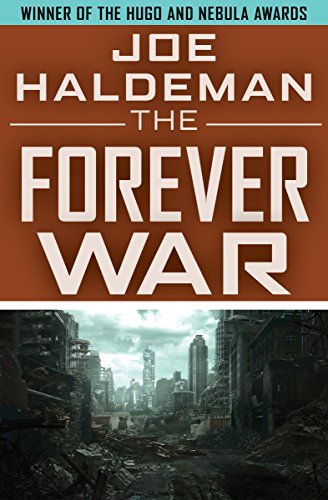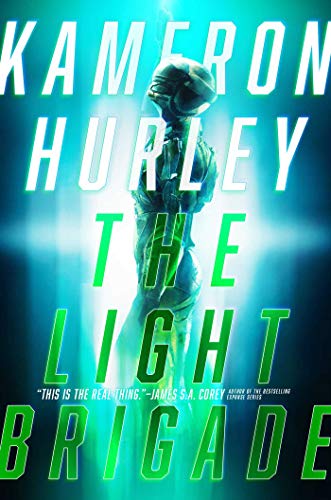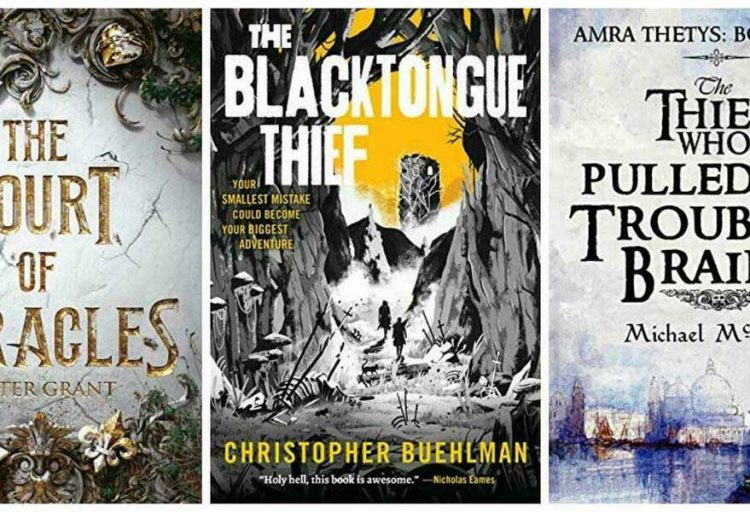Welcome to Shelf Care, where I review three books related by a theme. These aren’t necessarily the latest releases, but are hopefully books you can’t believe you missed.
This column’s theme: The Infantry of the Future. In these novels, the “boots on the ground” find themselves on some very strange ground indeed. All of these books revolve around the same premise: humanity has been attacked from space, and our protagonist has just enlisted. Where things go from there really seems to depend on how the most recent American war went. That said, let’s start with the first novel that really kicked this whole genre off…
So if you like
Powered armor
Award winning novels
Political philosophy
The stuff soldiers do when they’re not in combat
Simple solutions to complex problems
And a science fiction classic that may not have aged well
Where the story is told through the lens of:
World War Two, where war was very clearly marketed. Everyone knew who the bad guys were, and they definitely weren’t us.
You might like
Starship Troopers, by Robert A Heinlein
Overview
Johnnie Rico ends up fighting buglike aliens on their homeworld after they destroy a city in this clearcut classic of us vs them.
Sample passage
“Superficially, our system is only slightly different; we have democracy unlimited by race, color, creed, birth, wealth, sex, or conviction, and anyone may win sovereign power by a usually short and not too arduous term of service—nothing more than a light workout to our cave-man ancestors. But that slight difference is one between a system that works, since it is constructed to match the facts, and one that is inherently unstable. Since sovereign franchise is the ultimate in human authority, we ensure that all who wield it accept the ultimate in social responsibility—we require each person who wishes to exert control over the state to wager his own life—and lose it, if need be—to save the life of the state. The maximum responsibility a human can accept is thus equated to the ultimate authority a human can exert. Yin and yang, perfect and equal.”
“Uh, sir, why not go—well, go the limit? Require everyone to serve and let everybody vote?”
“Young man, can you restore my eyesight?”
“Sir? Why, no, sir!”
“You would find it much easier than to instill moral virtue—social responsibility—into a person who doesn’t have it, doesn’t want it, and resents having the burden thrust on him. This is why we make it so hard to enroll, so easy to resign. Social responsibility above the level of family, or at most of tribe, requires imagination—devotion, loyalty, all the higher virtues—which a man must develop himself; if he has them forced down him, he will vomit them out. Conscript armies have been tried in the past. Look up in the library the psychiatric report on brainwashed prisoners in the so-called ‘Korean War,’ circa 1950—the Mayor Report. Bring an analysis to class.” He touched his watch. “Dismissed.”
Takeaway
There’s a lot going on here, and only about half of that is in the book, as it has been no stranger to controversy. It won the 1960 Hugo for best novel, influenced a lot of military science fiction that came after (the two other books in this column being prime examples, and anything where fights happen using powered armor), and, for the time it was written, had some surprisingly progressive content, in that the best starship pilots are women, and the protagonist is ethnically Filipino.
I had really liked Starship Troopers it when I read it as a teenage boy (which was the target audience Heinlein had been writing for up to that point), and my takeaway at that point was that Starship Troopers was straight up, patriotic, good vs evil, black and white humans fighting aliens.
Re-reading it as an adult, well, it’s different than what I’d remembered. For starters, there is way, way more political theory and boot camp time than actually fighting aliens, and there’s the fact that Heinlein’s characters inhabit a parallel universe where everything and everyone is logical. Mature readers will note that this has only a passing similarity to the real world, where irrationality is rampant, and most issues presented as black and white really inhabit a spectrum of gray.
For example, the book opens with the protagonist participating in a ‘shock and awe’ raid on an alien planet where they’re destroying non-military targets, which is probably a war crime, but in Heinlein’s universe this sends a message to the aliens. I suspect that in our universe, it would likely raise up the next generation of terrorists seeking revenge, which gets to the core of the issues I have with this book as an adult. The political theory looks fine on paper, but every time it was presented, I kept mentally appending “but, of course, this is an oversimplification, and in the real world, it doesn’t work that way.” This is especially glaring when viewed through the lens of the American wars in Vietnam, Afghanistan, and Gulf War II (Electric Boogaloo).
In his defense, none of that had happened yet, (and the other books on this list have a more updated take on it) and perhaps Starship Troopers can be read as a more aspirational than actionable novel. Certainly it is worth reading to understand the source material for most of the military science fiction written after, and it’s an interesting book on its own, but readers will probably note that it hasn’t necessarily aged well.
Or if you like:
Powered armor
Award winning novels
Extreme one-way time travel
More action, less classroom lecture
A bit more skepticism in your protagonists
You might like
The Forever War, by Joe Haldeman
Where the story is told through the lens of:
Post Vietnam America, where the marketing of the war failed to match the product.
Overview
Bill Mandella becomes one of the first humans to fight aliens, but as the war goes on, the time spent traveling between stars puts him decades away from the home he is fighting for.
Sample passage
The Commodore began the briefing. ‘There’s not much to tell, and what there is is not good news.
‘Six days ago, the Tauran vessel that is pursuing us released a drone missile. Its initial acceleration was on the order of 80 gravities.
‘After blasting for approximately a day, its acceleration suddenly jumped to 148 gravities.’ Collective gasp.
‘Yesterday, it jumped to 203 gravities. I shouldn’t need to remind anyone here that this is twice the accelerative capability of the enemy’s drones in our last encounter.
‘We launched a salvo of drones, four of them, intersecting what the computer predicted to be the four most probably future trajectories of the enemy drone. One of them paid off, while we were doing evasive maneuvers. We contacted and destroyed the Tauran weapon about ten million kilometers from here.’
That was practically next door. ‘The only encouraging thing we learned from the encounter was from spectral analysis of the blast. It was no more powerful an explosion than ones we have observed in the past, so at least their progress in propulsion hasn’t been matched by progress in explosives.
‘This is the first manifestation of a very important effect that has heretofore been of interest only to theorists. Tell me, soldier.’ He pointed at Negulesco. ‘How long has it been since we first fought the Taurans, at Aleph?’
‘That depends on your frame of reference, Commodore,’ she answered dutifully. ‘To me, it’s been about eight months.’
‘Exactly. You’ve lost about nine years, though, to time dilation, while we maneuvered between collapsar jumps. In an engineering sense, as we haven’t done any important research and development aboard ship … that enemy vessel comes from our future!’ He paused to let that sink in.
‘As the war progresses, this can only become more and more pronounced. The Taurans don’t have any cure for relativity, of course, so it will be to our benefit as often as to theirs.
‘For the present, though, it is we who are operating with a handicap. As the Tauran pursuit vessel draws closer, this handicap will become more severe. They can simply outshoot us.’
Takeaway
Haldeman’s experiences as a combat engineer in Vietnam definitely color the tone of The Forever War. Mandella becomes more skeptical about the goals of the war, and experiences increasing isolation from the society he left at home as his near-lightspeed travels when he deploys take him further and further into the future, which raises questions about what he’s fighting for, if he’s never going to be able to go home even if he wins? While The Forever War has a few things in common with Starship Troopers, (in addition to winning a Hugo award for best novel) the difference here is that our protagonist is questioning things and, not just blindly following them.
Or if you like:
Blake Crouch’s Pines novels
Non-Linear Time Travel
The movie Edge of Tomorrow
Corporate mercenaries
You might like
The Light Brigade, by Kameron Hurley
Where the story is told through the lens of:
Post Iraq/Afghanistan War America, where the military industrial complex stepped in.
Overview
Private Dietz enlists after Martian colonists vanish everybody in Sao Paulo, and discovers that the transporters being used to beam them into combat sometimes have unusual side effects.
Sample passage
They said the war would turn us into light.
I wanted to be counted among the heroes who gave us this better world. That’s what I told the recruiter. That’s what I told my first squad leader. It’s what I told every CO, and there were… a couple. And that’s what I’d tell myself, when I was alone in the dark, cut off from my platoon, the sky full of blistering red fire, too hot to send an evac unit, and a new kid was squealing and dying on the field.
But it’s not true.
I signed up because of what they did to São Paulo. I signed up because of the Blink. All my heroes stayed on the path of light, no matter how dark it got. Even bleeding-heart socialist drones who play paladin can take an oath of vengeance to justify violence. I did.
The enemy had eaten my family and the life I once knew; a past I now remember in jerky stutter-stops, like an old satellite image interrupted by a hurricane. I wanted to be the light: the savior, the hero, sure.
But more than that, I wanted the enemy obliterated.
How many other corporate soldiers signed up for money, or voting rights, or to clear a debt, or to afford good housing, or to qualify for a job in one of the big towers?
I believed my reasons were nobler.
Takeaway
This really reads as an updated counterargument to Starship Troopers, Starting from the same place of enlisting after being provoked, what does that war look like through the lens of the way wars have played out over the last seventy years? Here allegiance is to a corporation, not a country. Being a citizen means not living in squalor, and as the novel progresses, the protagonist and the reader get a better picture of what’s really going on here, and none of it is flag waving good. The Light Brigade is well paced, and tightly written, which perhaps is no surprise as Hurley notes in the afterword that an Excel spreadsheet and some mathematical modeling was used to keep the chronology straight. Indeed, it was that tidbit that had me going hunting for a copy of the book, and my need to put all the pieces together that had me staying up way too late to finish it.
So, what other books should be on this list? Leave your thoughts in the comments, and stay tuned for my next column.








Leave a Reply